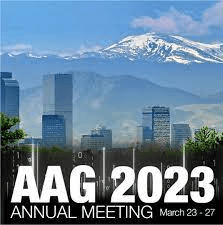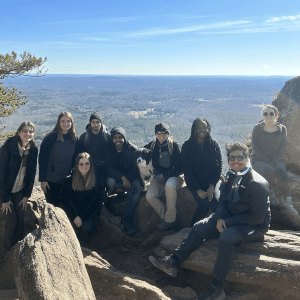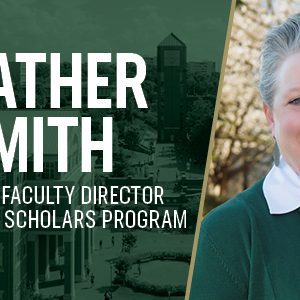News

Urban Planning at South Mountain State Park
On Sunday April 2nd, Dr. Idziorek and Dr. Zuñiga, both professors in Urban Planning joined Peaks with Professors and hiked a challenging 4.7 mile loop following the High Shoals Waterfall, which is about 1.5 hours from campus. The hike brings together students of all backgrounds and interests across the University and exposes them to the […]

GES faculty and students have a large presence at this year’s AAG conference
The Department of Geography and Earth Sciences was well represented at the recent Annual Meeting of the American Association of Geographers in Denver, Colorado. A large contingent of Geographers from UNC Charlotte (faculty and both current and former students) were present this year in Denver! In addition to presentation of research in various paper, poster […]

GES Students and Faculty attend GSA meeting in Virginia
On March 17-19th, a group of students and faculty from the Department of Geography and Earth Sciences traveled to Reston, VA to attend the joint meeting of the Northeastern and Southeastern sections of the Geological Society of America. Students Kayla Eury and April Ryley (pictured above) helped run the departments recruitment booth during the conference. […]

Dr. Larianne Collins joins Peaks and Professors to hike Crowder’s Mountain
On Saturday, February 4th Dr. Larianne Collins along with members of the Peaks and Professors organization on campus hiked Crowder’s Mountain. These hikes are designed to so that students from across the UNC Charlotte community can come together for some inclusive, affordable fun where they can meet new friends, chat with a professor, and get […]

Eric Webb (M.S., 2020) Wins Regional Award for Master’s Thesis
Eric Webb (MS Earth Sciences) is the winner of the 2023 Conference of Southern Graduate Schools (CSGS) Master’s Thesis Award, and he is the first Masters student from UNC Charlotte to ever win! His MS thesis, “Reanalysis of the Extended Multivariate ENSO Index”, was in the Math, Physical Sciences, and Engineering category of the CSGS […]

GES Students and Faculty attend AMS in Denver, CO
Students and faculty from Geography and Earth Sciences represented UNC Charlotte at the American Meteorological Society (AMS) Annual Meeting https://annual.ametsoc.org/index.cfm/2023/ in Denver from January 7-12. The conference hosts thousands of attendees with applied and theoretical research related to atmospheric sciences, and includes both a Student Conference and the Full Conference. The STORM club would like […]

Dr. Heather Smith named director of the Levine Scholars Program
Heather Smith, professor of geography, interim chair of the Department of Geography and Earth Sciences and Levine Scholars faculty fellow has been appointed faculty director of the Levine Scholars Program, effective July 1, 2023. She succeeds Diane Zablotsky, who will return as a faculty member to the Department of Sociology. Smith served as the director […]

Dr. Sandra Clinton inspires new generations of women in STEM
Sandra Clinton loved science from her earliest school experiences — and imagined a career working for a science-related nonprofit or government agency. “I wanted to save the world and change it,” she said. Clinton, a research assistant professor in UNC Charlotte’s Department of Geography & Earth Sciences, has found different ways to change the world […]

The Charlotte Action Research Project (CHARP), highlighted in US News and World Report
The Charlotte Action Research Project (CHARP) led by Dr. Colleen Hammelman received a national shout-out in the December 11th edition of US News and World Report. CHARP has been working in partnership with the Harris YMCA to conduct a needs assessment for their Parent as Teacher (PAT) and other immigrant supporting programs. For more on […]

Terry Shirley Wins UNC Charlotte Award for Teaching Excellence
Congratulations to our own Terry Shirley for being this years winner of the UNC Charlotte Award for Teaching Excellence. Full article here